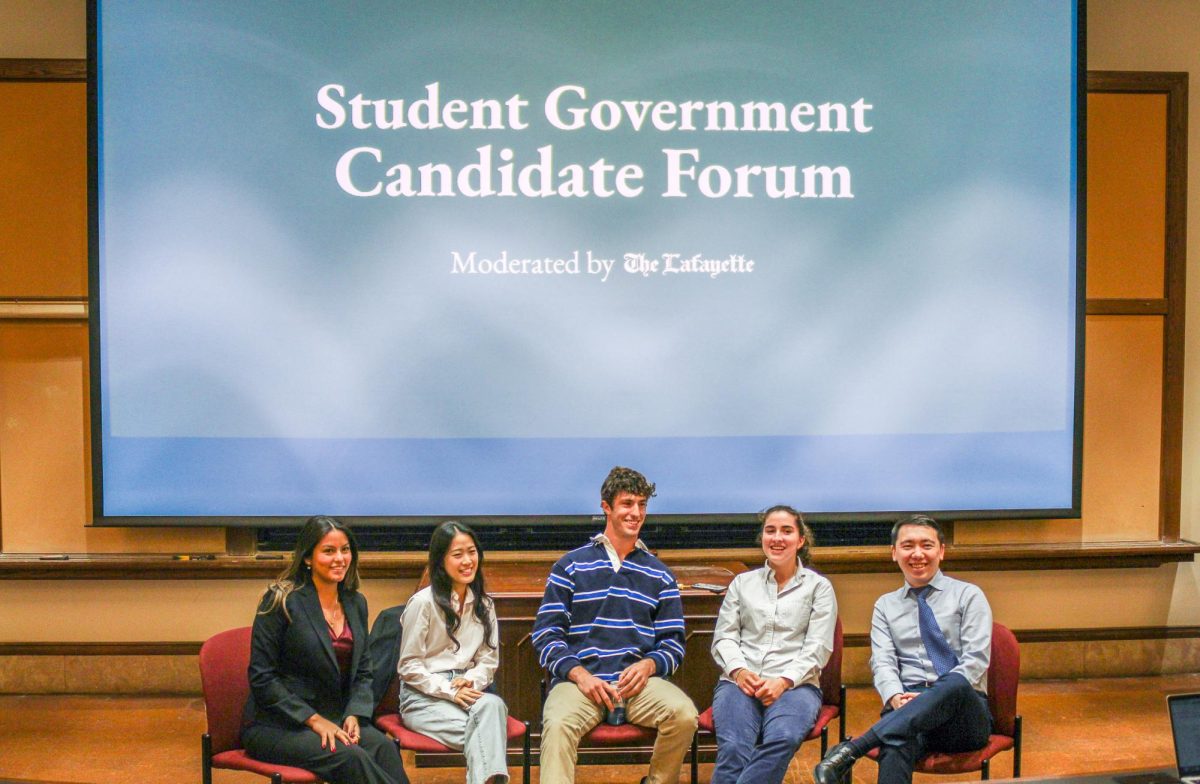Student Government executive board candidates, all unopposed, fielded questions from The Lafayette at a forum on Oct. 30.
The forum, which was live-streamed and posted on YouTube, attended by roughly 30 students and some administrators, including college President Nicole Hurd, was moderated by editor-in-chief Madeline Marriott ’24 and managing editor Emma Chen ’24 of The Lafayette.
After brief introductions from the candidates, a question was posed to each of them asking why they were running unopposed and why they believe students should vote regardless.
Thania Hernandez ’25, the candidate for president, answered first.
“The main reason why people didn’t run for president is because everyone’s going abroad,” Hernandez said. “All of the juniors are going abroad.”
Not all of the junior class representatives are going abroad, however. Representatives Kelsey Wong ’25, Alex Darrah ’25, Chelsey Cochrane ’25 and Molly Nylund ’25 are each staying on campus next semester, while Representatives Rhea Bandyopadhyay ’25 and Anna Fenkel ‘25 are studying abroad. Representative Virginia Sacotingo ‘25 did not respond to a request for comment on Wednesday. Sophomores are also eligible to run for the executive board.
Regardless, Hernandez emphasized that people should treat the election as if it were hotly contested.
“I do think that people should vote,” Hernandez said. “Either [use] your vote to vote for us or to abstain, but [you should have] that freedom to have a say in what you want in office for Student Government.”
Likewise, Christo Maheras ’26, the candidate for treasurer, commented that he is the only returning member on the budget committee.
Although Maheras was disappointed at the lack of opposing candidates, he believes his previous experience makes him fit for the task.
“I have the know-how and the ideas to carry the office forward,” Maheras said.
The moderators then directed a question towards Hernandez on her recent vote against opening the positions of vice president and treasurer to the student body. This was a source of controversy at recent Student Government meetings.
Hernandez answered that she had mentors going into assuming the vice presidency and that being vice president is a “hard job.” She also argued the need for prior experience as the treasurer.
“[The treasurer] has to deal with hundreds of clubs on campus, and so for that, they absolutely need the experience on the budget committee,” Hernandez said.
Candidates for treasurer are not required to have served on the budget committee.
When asked later in the forum, Chris Kirch ’26, the candidate for parliamentarian, disagreed and argued that executive positions should be made open to those outside of student government.
“I don’t think we should equate experience to competency,” Kirch said. “Experience can be fostered through transitional programs between different terms and making sure that individuals are in those roles for a certain amount of time.”
Regarding the ongoing issue of vacancies in Student Government positions, Hernandez was also questioned on her delay in advertising the opening of these vacancies. Moderators explained that while Hernandez promised applications would open the week of Sept. 10, they were not advertised until Sept. 27. This was after Student Government promised in February to fill the vacancies “as soon as possible.”
“In genuine terms, it was a lack of communication within internally,” Hernandez said. “I also am a student and a person so my sole job is not just to be vice president, but to be a student and to be the best student I possibly can be.”
Yuko Tanaka ’26, the candidate for vice president, also weighed in on vacancies, calling on the need for Student Government to be more transparent. The vice president is also responsible for recruiting and retaining members of Student Government.
“Currently we are talking about having a shadowing experience for incoming freshmen and also other students who are interested in Student Government and what we do,” Tanaka said.
Student Government has also been observed to have disorderly meetings that start late and run short, with members distracted by their cell phones. The moderators brought this issue up to Hernandez who, as president, would be the presiding officer of Student Government.
“I wouldn’t say that’s necessarily the truth … the meetings have been ending earlier than usual just because there has been an established agenda that has been carried out more in these last couple of meetings,” Hernandez said.
Student Government has continuously pushed items on its agenda at meetings to future meetings in order to save time.
Moderators also asked about Student Government’s budget and the controversy surrounding it – clubs have consistently complained of being underfunded.
“To really gain trust from and transparency of the students on this campus, what I will do as a budget committee chairman is add one more [set of] office hours per week,” Maheras said. “I also want to host seminars for people to learn how to budget … so that [clubs] know what we think when we go through this process.”
Maheras added that he was confident in Student Government’s handling of the budget this semester.
“We told everyone at the start of the year that we have 300,000 to give this semester and 300,000 to give next semester,” Maheras said. “We’re damn close, and in the past that has not been the case.”
Budget decisions are conducted by Student Government under executive session, meaning no member of the public is allowed to watch the deliberation. Reporters for The Lafayette have been asked to leave Student Government meetings while the budget is deliberated. Maheras said that this is done because the needs of individual clubs are different and that discussing the budgets of clubs in public view “distracts from the point of the overall budget.” All students contribute money to the Student Activity Fee, utilized by Student Government to allocate club budgets.
Despite this, Maheras said he would work to make budget decisions more transparent.
Elle Lansing ’26, the candidate for communications officer, also voiced her plans to make Student Government more transparent.
“I think the work that we do in [committees] should be shared with the general community, whether… that would be through [Student Government’s Instagram], committee updates, news reports and possibly spotlighting what we do in specific groups,” Lansing said.
Lastly, candidates discussed their pertinent experiences and motivations for running for the executive board.
“One of the major things that I want to work on … is definitely getting more internal connection within the Student Government,” Hernandez said. “I want to invite them to dinner with me, so we can be friends and talk … I think this is really important because it allows for more change to happen, but also just friendly conversation [and] friendly debates.”
The forum concluded with final remarks from each of the candidates. Despite the wide variety of opinions, one message reigns true for all: “Please get out and vote.”
Voting began on Oct. 31 and will run through Nov. 7.
William Gutiérrez ’27 contributed reporting.
























































































































